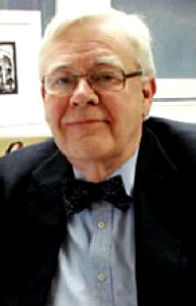De Amerikaanse dichter en letterkundige Eric Linn Ormsby werd geboren op 16 oktober 1941 in Atlanta. Ormsby begon als jonge man met het schrijven van poëzie en publiceert vanaf 1985. Er verschenen tot nu toe zes poëziebundels van hem: “Bavarian Shrine and Other Poems” (1990), waarvoor hij de Quebec-prijs ontving voor de beste poëzie van dat jaar, “Coastlines” (1992), “For a Modest God: New & Selected Poems” (1997), “Araby” (2001), “Daybreak at the Straits” (2004) en “Time’s Covenant” (2006). Zijn gedichten werden voorts gepubliceerd in verschillende kranten en tijdschriften zoals The New Yorker en The Paris Review en opgenomen in bloemlezingen als “The Norton Anthology of Poetry”. Hij is ook auteur van een essaybundel over poëzie, vertalen en Arabische literatuur. O.a. The Wall Street Journal en New York Times publiceren regelmatig zijn boekbesprekingen. Als academicus publiceerde Ormsby veel over het onderwerp islamitisch denken, zoals “Theodicy in Islamic Thought” (1984), “Handlist of Arabic Manuscripts” (1987), “Moses Maimonides and His Time”. (1987) en “Ghazali in Ghazali: The Revival of Islam” (2008). Ormsby vertaalde ook de werken van het klassieke islamitische denken van Ghazali en Nasir-i Khusraw en de invloedrijke geschriften van de moderne Perzische denker Mohammad Amir-Moezzi. Ormsby woonde lang in Montreal, waar hij directeur was van de universiteitsbibliotheek en vervolgens hoogleraar islamitisch denken aan het McGill University Institute of Islamic Studies. Tegenwoordig woont en werkt hij in Londen, waar hij hoogleraar en hoofdbibliothecaris is van het Institute of Ismaili Studies.
Old Photographs Of Children
The cracked and spotted photographs
of children dead a century before
pierce us when we look at them.
The glister of an eye
long consigned to cinders and
the maggot’s mercies
engages our gaze.
How near these children seem to us
and yet how intimate with
nothingness, as though for them
the double kingdom lay
already open as a realm of light.
The sureties of hopefulness
burning in their long-dead look
disturb our own uncertainty, refuse
our knowledge of a future that awaits
beyond the borders of the photograph.
We have the superior sense
that we encompass these children in their ignorance
of all that happened since they left their pose,
unless we come to see how they elude
all our displaced solicitude,
their silver and palladium faces clasped
in the fragile grandeur of daguerrotypes.
Skunk Cabbage
The skunk cabbage with its smug and opulent smell
Opens in plump magnificence near the edge
Of garbage-strewn canals, or you see its shape
Arise near the wet roots of the marsh.
How vigilant it looks with its glossy leaves
Parted to disclose its bruised insides,
That troubled purple of its blossom!
It always seemed so squat, dumpy and rank,
A noxious efflorescence of the swamp,
Until I got down low and looked at it.
Now I search out its blunt totemic shape
And bow when I see its outer stalks
Drawn aside, like the frilly curtains of the ark,
For the foul magenta of its gorgeous heart.

Eric Ormsby (Atlanta, 16 oktober 1941)
